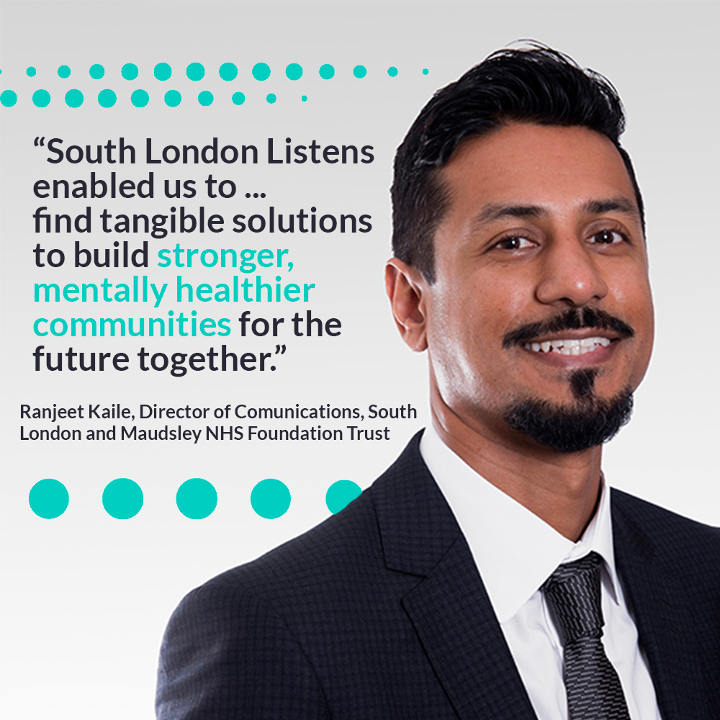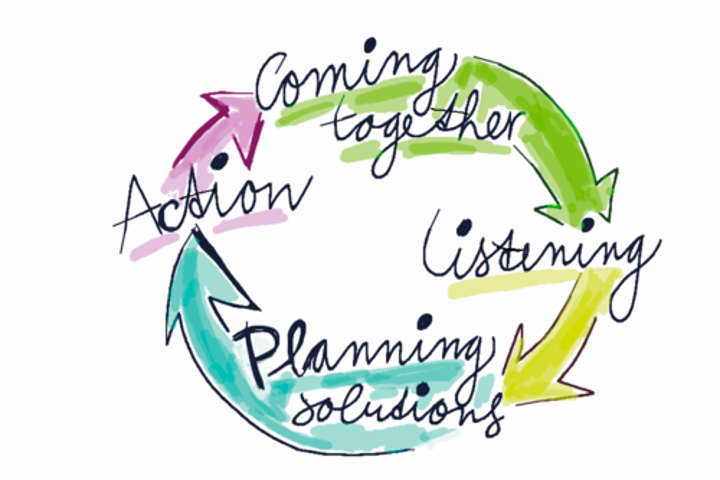South London Listens: a case study in community engagement
01 August 2022
“Often, one of the most radical and effective ways you can engage is just to listen.”
– Ranjeet Kaile, Director of Communications and Engagement at South London and Maudsley NHS Foundation Trust and South East London Integrated Care System
We recently sat down with Ranjeet Kaile, Director of Communications and Engagement for South London and Maudsley NHS Foundation Trust, a leading mental health trust and one of the NHS providers involved in South London Listens – an innovative approach to community engagement. Ranjeet and a small core team have been a driving force behind the programme.
GGI: So, what is South London Listens?
Ranjeet:
South London Listens is a partnership between NHS, local authorities and community organisations to support communities across South London deal with the long-lasting mental health impacts of the Covid-19 pandemic.
People’s health and wellbeing is complex. As those involved in commissioning and providing services, how we learn to make a difference together is crucial and this programme takes an integrated approach across South London.
How we do that starts with understanding what our shared priorities are. Nothing ever happens in isolation. If you think about mental health – it has cross over with so many other areas including social care, housing, environment, schools, employment, healthy lifestyle, access to open spaces etc.
If we come together, it's much more possible to tackle the root causes of good health and wellbeing. We also wanted to really understand the barriers people faced to getting support so we could address them too.
We know the pandemic has had a huge impact on mental health and we wanted to do something about that, but we wanted to do it with our communities, not to them.
GGI: How did it start?
Ranjeet:
It started during conversations between three of the mental health trusts in London about the mental health challenges posed by the pandemic and the things we were hearing from communities.
We were increasingly concerned with the mental health fallout of Covid-19, with the rising numbers of people in south London struggling with the impact of the virus on their health, that of loved ones, on jobs and social lives and the challenges of social isolation and loss.
The initial discussions branched out to include other partners, like the local authorities and local voluntary organisations.
The partnership gained momentum and a few months into the pandemic, over 25 of us, including the three mental health trusts, local authorities, schools, colleges, universities, Healthwatch, and voluntary and community groups from across south London came together with Citizens UK – a national community organising charity made up of an alliance of diverse local communities working together for the common good – to formally work together. We convened a meeting to establish a new taskforce in June 2020.
Ann Beasley CBE (Chair, South West London and St George’s Mental Health NHS Trust) Sir Norman Lamb (Chair, South London and Maudsley NHS Foundation Trust) and Rev Canon Dr Rosemarie Mallett (Bishop of Croydon), were selected as the co-chairs of the task force.
GGI: What was the purpose and role of the taskforce? How was this communicated?
Ranjeet:
Well, our mission was ‘working together to promote recovery and prevent a mental ill-health crisis as a result of the impact of Covid-19'. We wanted the purpose of the taskforce to be to design solutions and focus services, particularly preventative services, on the needs of our people, and our communities. So, the listening aspect was absolutely crucial. We wanted to co-produce the purpose and role of the taskforce. Which meant that, to start with, our sole purpose was to listen.

GGI: What happened next?
Ranjeet:
South London Listens was officially launched in June 2020 with a virtual event attended by over 1,000 people who were keen to help take an organised approach to the unique challenges that the Covid-19 pandemic presented. This was followed by establishing a taskforce with representatives from statutory, voluntary and community sector organisations helping to shape the programme. In November 2020 we held a major community summit and launched an in-depth four-month listening campaign – conducted through a variety of mediums including community meetings, group conversations and 1:1 meetings. We asked our community what they felt was having the biggest impact on their mental health.
In total, the taskforce listened to over 6,000 local residents and community groups and members of staff. As well as the listening campaign, over 300 local leaders were trained in community engagement.
GGI: That’s extraordinary. There aren’t many public engagement exercises that happen at that scale. How did you collate and bring together so much feedback to consolidate it into clear priorities? Or did a number of key themes emerge?
Ranjeet:
Following the initial listening campaign, we were surprised that the issues that were impacting our community’s mental health were so much broader than what had originally thought. Four main themes emerged (as below):

Statutory organisations have a big role to play but we knew that for South London Listens to be a meaningful programme, the solutions to these issues had to come from, and be owned by, our community.
To help develop the right solutions we held a series of ‘Problem-to-issue’ workshops which were co-chaired by NHS, local authority and community leaders. We used the workshops to hone in on our community’s priority areas.
The workshops were great, really engaging, interesting sessions and they really did help define what have become the four key priorities for South London Listens and 22 co-produced solution-focused pledges that our NHS and Local Authority partners agreed to deliver on.
GGI: I love the idea of problem-to-issue workshops. A really clear purpose to them. I was listening to an NHS chair speaking recently and she was talking about patient experience and said ‘If you listen, people will tell you things’. It is so obvious as to be banal and yet is also really powerful. Good engagement is about doing the simple things right. The word pledge is interesting...
Ranjeet:
Yes, well that’s a key part of this whole project – to conduct it in public, with the community in an open and transparent way. A lot of people talk about co-production but it’s rare that you see it done properly because of the time it takes to build the levels of trust needed to develop and deliver something that everyone can sign up to. We wanted the governance of this to happen in full public view and scrutiny. We also wanted our community to be sitting at the table – with real power to make the decisions that would have the biggest impact on them. Real, visible, accountability.
A good example is that up until this point the statutory organisations had been organising the community summits. At the end of the listening campaign our community told us they wanted to organise the next summit and that we, the statutory organisations would be invited to their summit. The priorities and 22 co-produced solutions we arrived at for how support could best be provided were presented by the community to the leaders of the partner organisations at a community summit in June 2021. The leaders of the partner organisations were then asked to pledge, at the summit in front of those assembled, to the priorities and the 22 solutions.
GGI: That’s really powerful. I can imagine that must have been a really effective way of building trust with the communities about the intention and meaningfulness of the project. Were the leaders nervous about the approach? Were you nervous!
Ranjeet:
It was powerful and it did help build trust in the process. The public is so used to being ‘consulted’. Asked but not really listened to. Or if they are, they are never sure of it because they get asked about something and then they rarely get told what happened to their feedback as a result, what decisions were taken, when, how and by whom. We were determined to run this as an open, transparent and truly community-driven process. There may have been some nervousness about it but balanced against the fact we all knew it was the right thing to do.
GGI: What happened with the priorities and the pledges?
Ranjeet:
Following the community summit in June 2021, we developed an action plan, setting out in detail how we are going to deliver on the pledges we made at the summit.

We launched our two-year plan in October 2021 which is now actively being delivered in partnership with the community and all those who pledged support. We will be coming back together again for another community summit soon, at which the taskforce leaders will be held to account by the community for how they have delivered on the priorities and the pledges.
You can find out more about South London Listens via its dedicated website: https://www.southlondonlistens.org/
